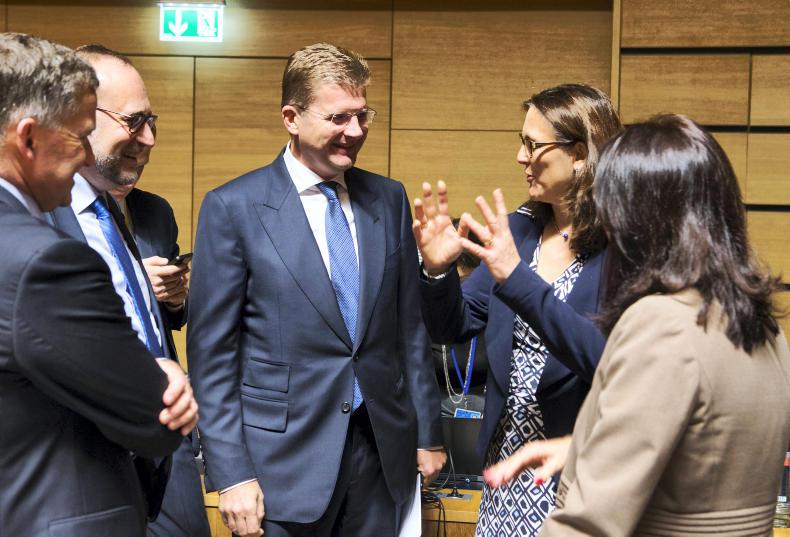At a press conference concluding the meeting, its chair, Slovak Minister for Economy Peter Ziga, said that all EU member states except Belgium were ready to sign the treaty. “Consultations are still ongoing in Belgium to find a solution,” he said, stressing the “commitment” from other members of the European Council of trade ministers and the European Commission to sign the text at a summit with Canadian Prime Minister Justin Trudeau next week.
Ziga was cautiously optimistic, saying “it is not a sprint, but it is not a marathon either”. He added that other countries including Bulgaria and Romania also raised issues, without formally opposing the deal.
European Commissioner for Trade Cecilia Malmström, also vowed to keep talks alive in the coming days. “The talks are intense and they continue,” she said. “If I didn’t think we could solve this Belgian question, we wouldn’t keep engaging with them.”
Social, environmental and farming concerns
Votes taken by regional parliaments representing around four million French-speaking Belgians have rejected the treaty, citing social and environmental concerns, as well as fears over dispute resolution mechanisms that could bypass national authorities.
According to local media, some assembly members also called for a clause to be added to the treaty, so that agricultural commodities can be taken out of the free trade agreements if needed in the future.
Reopening the treaty is not on the agenda
A declaration attached to the treaty and explaining how it should be interpreted is being explored as a way of addressing Belgian concerns, but “re-opening the treaty is not on the agenda”, Malmström said.
She added that the planned timeline was for the agreed treaty to enter into force provisionally in January, with formal ratifications from all member states coming afterwards.
The Commissioner will not have to travel far to try and get CETA over the line as the regional authorities that are holding back the deal cover the Wallonie region and part of Brussels, the European institutions’ capital.
Read more
Irish beef processors want Canada trade deal
Uncertainty over the progression of EU-Canada trade deal
At a press conference concluding the meeting, its chair, Slovak Minister for Economy Peter Ziga, said that all EU member states except Belgium were ready to sign the treaty. “Consultations are still ongoing in Belgium to find a solution,” he said, stressing the “commitment” from other members of the European Council of trade ministers and the European Commission to sign the text at a summit with Canadian Prime Minister Justin Trudeau next week.
Ziga was cautiously optimistic, saying “it is not a sprint, but it is not a marathon either”. He added that other countries including Bulgaria and Romania also raised issues, without formally opposing the deal.
European Commissioner for Trade Cecilia Malmström, also vowed to keep talks alive in the coming days. “The talks are intense and they continue,” she said. “If I didn’t think we could solve this Belgian question, we wouldn’t keep engaging with them.”
Social, environmental and farming concerns
Votes taken by regional parliaments representing around four million French-speaking Belgians have rejected the treaty, citing social and environmental concerns, as well as fears over dispute resolution mechanisms that could bypass national authorities.
According to local media, some assembly members also called for a clause to be added to the treaty, so that agricultural commodities can be taken out of the free trade agreements if needed in the future.
Reopening the treaty is not on the agenda
A declaration attached to the treaty and explaining how it should be interpreted is being explored as a way of addressing Belgian concerns, but “re-opening the treaty is not on the agenda”, Malmström said.
She added that the planned timeline was for the agreed treaty to enter into force provisionally in January, with formal ratifications from all member states coming afterwards.
The Commissioner will not have to travel far to try and get CETA over the line as the regional authorities that are holding back the deal cover the Wallonie region and part of Brussels, the European institutions’ capital.
Read more
Irish beef processors want Canada trade deal
Uncertainty over the progression of EU-Canada trade deal






 This is a subscriber-only article
This is a subscriber-only article










SHARING OPTIONS: